The agony of Borno women struggling to get justice for missing husbands, sons
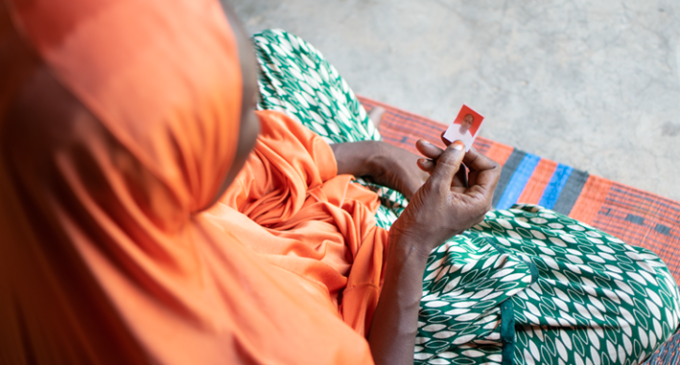
Women of Borno have seen it all: Torture, killings and prolonged detention of their sons and husbands by soldiers fighting insurgency in the north-eastern part of the country since 2009 when Boko Haram insurgency started.
Now the women can no longer bear suffering and injustice that come with military intervention in the north-east crisis, and therefore have started demanding accountability from the Nigerian Army.
Ajibola AMZAT, editor of The ICIR, reports about the struggle of Borno women seeking justice for their men, some of whom have been killed, or for nearly a decade, detained by the Nigerian Army for the offence they are yet to be convicted for.
WALID returned from school at noon on Wednesday, March 27, greeted his grandmother Hajja Gana Suleiman, and other women seated under the mango tree in a fenced building located at Gwange, a suburb of Maiduguri in north-eastern Nigeria.
He later disappeared into a brick house to remove his school uniform – a blue trousers, checked shirt and blue jacket.
“That boy was seven last January,” his grandmother said with a mixed feeling of pride and sorrow that later dissolved into an outburst of tears.
“He was in his mother’s womb when soldiers snatched his father from us”.
Walid’s father, Mustapha Abudul Kareem Saina, was arrested by the army on October 10, 2011, at a mosque in Bollori 2 Maiduguri, where he went to pray.
The soldiers, dressed in combat uniform, came down from military vehicles and surrounded the mosque at dawn.
Then they ordered every worshipper outside, about 30 of them, then separated the young from the old and took the youths away.
Saina was 25 years old at the time.
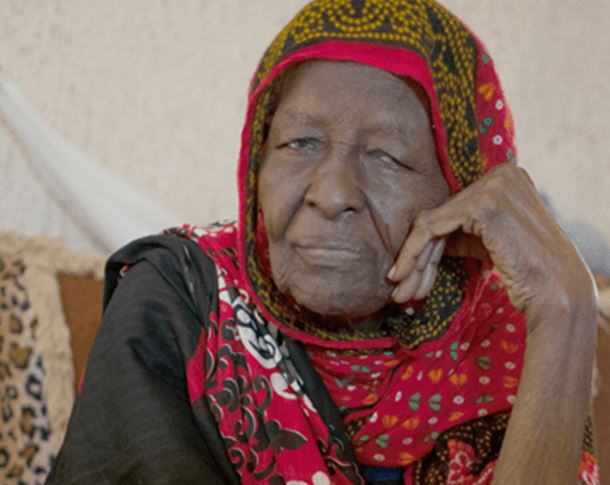
Mustapha Saina’s grandmother
When his pregnant wife, Nafisat heard that her husband was among those taken away, she rushed to Giwa barracks, one of the military facilities in Maiduguri where suspected Boko Haram members were detained.
As of April 2018, the detention facility held more than 4,900 people in extremely overcrowded cells, according to Amnesty International. And many of them are people the army suspected of being insurgents or their sympathisers.
Between 2009 and 2016, Boko Haram, the dreaded group that desires to set up a new political order governed by Islamic law in the north-east, had killed more than 5,000 civilians and uniformed men, and had displaced hundreds of thousands of others, according to UNDP.
The insurgency started a decade ago when the security agents killed their group’s leader, Mohammed Yusuf. The conflict later snowballed into full-scale terrorism to the embarrassment of the military establishment that was caught unprepared.
The soldiers eventually became frustrated about losing battle to the insurgents who were a mere ragtag group of religious zealots, and therefore escalated offensive that indiscriminately targeted youths of Maiduguri.
Nafisat wanted to tell the soldiers who arrested her husband that he was not a member of that murderous group. But she could only make a few desperate sentences before a dreadful-looking soldier landed several slaps on her face and ordered her to go home.
Unshaken, she later returned to the barracks with her mother-in-law, Hajja Gana, to plead for the release of her husband, but the supplication of both women fell on deaf ears. For a brief moment, the two women saw their breadwinner among other scared stiff detainees, but they could not come near him.
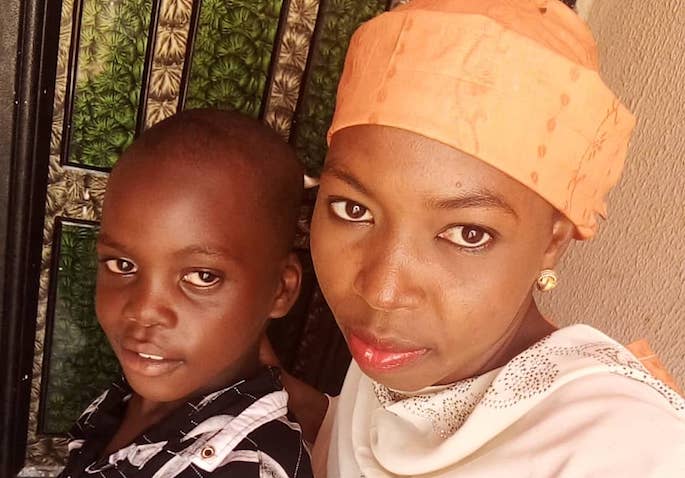
Walid and his mother Nafisat
“From where he was held, my son cried to me that I should do everything possible to get him out. I was very sad seeing him in that condition. I swear to Allah, he is not a Boko Haram member. My son is not a Boko Haram member. Walahi, he is not,” the mother told The ICIR.
Since 2011 to date, Saina’s wife and mother have been waiting almost hopelessly for the day he will in freedom walk back home. But he has not. And it is uncertain he will any time soon, even if he is still alive.
But the two women are yet to inform Walid the truth about the condition of his father, seven years after his birth.
“I have not yet had the courage to tell him what happened to his father. It’s hard for me to tell him,” the old woman said, as tears of frustration rolled down her cheeks.
Overwhelmed by their own misfortune, other women seated on the floor joined her. Each woman taking time to bewail the disappearance of their sons or husbands.
They are members of Jire Dole, a network of survivors and relatives of missing persons of the Boko Haram insurgency. The group was formed about two years ago to put pressure on the government to account for the whereabouts of their sons and husbands. Women from different families, joined by a common burden of grief, share their experience with The ICIR. At the last count, the group membership was over 3000.
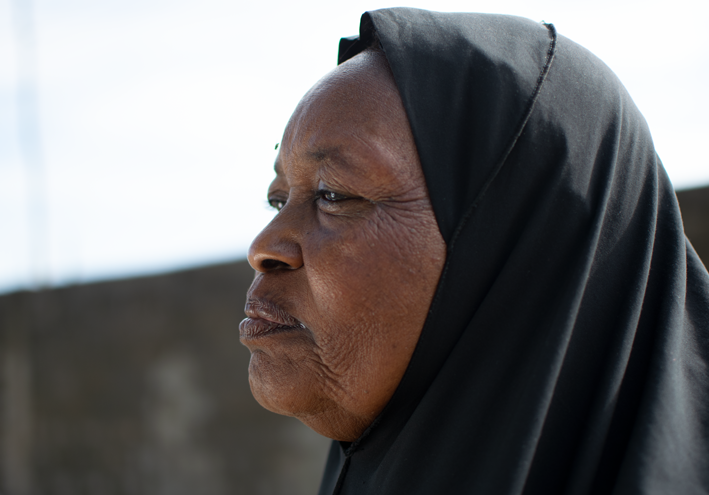
Hajja Gana, leader of Jire Dole
One of them was Zainab Muhammed, a 53-year-old Kanuri woman. Her son, Ibrahim Muhammed aged 16, was arrested in 2012 on Baga Road in Maiduguri on the way to the market where he went to buy thread and other sewing materials.
He went with his elder brother; both are apprentice tailors. But it turned out that soldiers were conducting raid that morning, an operation that has almost become a routine in the city of Maiduguri. Many young men escaped arrest that day, but Ibrahim was unlucky.
When the news of his arrest reached home, his parents dashed out to secure his release before he could be taken into detention. But they were not fast enough.
“It was raining heavily that morning, yet we dashed out, walked long distances in the rain, and we did not feel it. When we reached Sector One in Baga road, soldiers chased us away, threatening to shoot if we didn’t go back. I became ill when I got home, coughing seriously,” Zainab recounted.
For three months she was home-bound and heard no news of her son. When she was told later that those arrested had been taken to Giwa barracks, her hope of seen Ibrahim again dimmed. But a Good Samaritan showed forth – or so she thought. He was a soldier. He promised to help Ibrahim gain freedom. And to do that, he would have to bribe several guards at Giwa barracks.
He demanded N300, 000, but the family could only raise N150, 000, borrowed at a high-interest rate. An arrangement was made. Ibrahim would be brought loaded together with corpses of suspected Boko Haram members due for the morgue that day.
That time, in Maiduguri, a military ambulance (Hiace bus)with registration number N432 used to discharge heaps of corpses every week at the hospital. The ambulance did many trips in a day, a resident who worked with the Human Rights Commission in Maiduguri told The ICIR.
On April 2, 2013, not fewer than 67 unknown corpses deposited in Borno State Specialist Hospital were waiting to be disposed by Borno Environmental Protection Agency, BOSEPA, according to a document obtained by The ICIR.
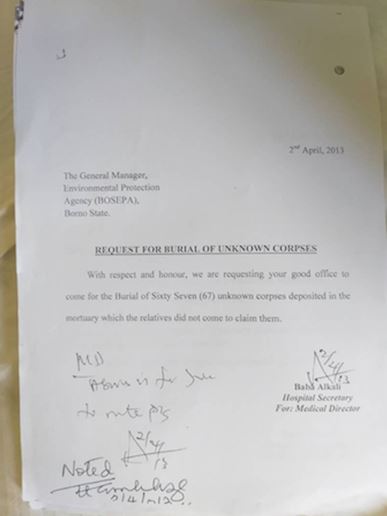
The document
But on the day the soldier promised to bring Zainab’s son along with dead bodies , the soldier was nowhere to be seen. Though corpses of many youths were delivered at the hospital that day, Ibrahim was not among them.
“We waited all day, but he did not show up. The man [the fraudulent soldier] has a Christian name, but I cannot remember again. His duty station used to be Borno State Specialist Hospital,” she told The ICIR amidst tears.
DOUBLE JEOPARDY
Several members of Jire Dole interviewed by The ICIR confirmed that soldiers at one time or the other visited the community, and persuaded them to pay some money in order to have their children released so that they would not die in detention. Often, they requested money or food or clothes from relatives on behalf of the detainees.
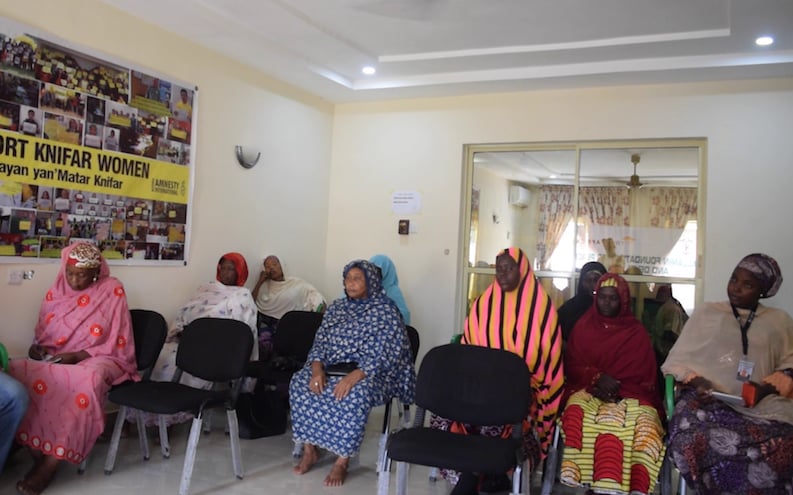
Members of Jire Dole at a meeting
“The soldiers would come to the locality asking whether you have anybody in prison, and if you say “yes”, they would tell us he needs food, cloth and money, and we gave them. But we never saw the person we were sending money or food,” said Aisha Modu, 45, whose husband, Modu Foyo, 56, was arrested in November 2012.
Before his arrest, Foyo was an employee of Magumeri local government council. He also used his private car for intra-city taxi service. That was how he catered for his large family of 10 children and a wife, until his unfortunate encounter with the khaki boys.
During one of his trips, he came across soldiers at a roadblock in Goni Dagari. The soldiers ordered all the passengers including Foyo to disembark and lie down on the floor. Women who witnessed the scene said Foyo presented his identity card as a government official, but no one listened to him. After a brief search, all men in the car were taken to Maiduguri prison from where they were later transferred to Giwa barracks.
For the past seven years, he has remained in detention, and Aisha became saddled with the responsibility of caring for the children: five boys and five girls.
“We consulted marabouts [a Muslim holy man] who asked us to fast and pray. It was the only thing to do in that circumstance,” she said.
Baba Gana Kolo, a lecturer at the department of sociology and anthropology, University of Maiduguri, once explained why people of Borno easily resign to fate in the face of adversity. Before the establishment of Civilian Joint Task Force, people in this city responded to the insurgency with prayer rather than action, he said in an interview with this reporter in 2015.
Borno people believe so much in supplication to the transcendental than to seek a pragmatic solution to problems.
But prayer is yet to bring back Foyo to reunite with his family.
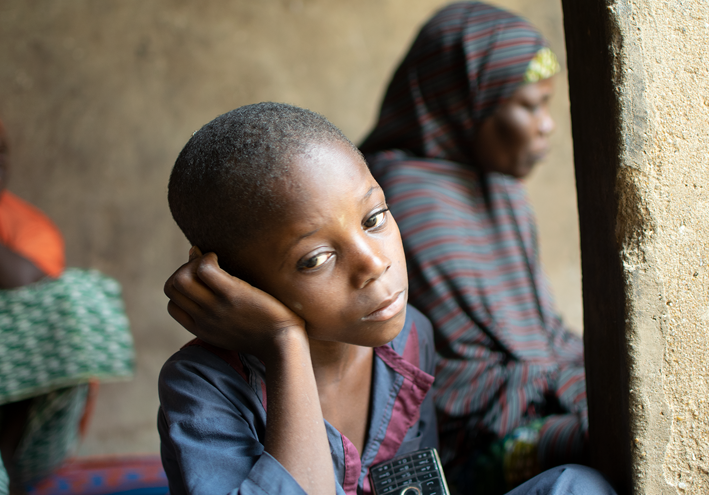
Foyo’s wife and his last son who was an infant when his father was taken.
When Giwa barracks was attacked on March 14, 2014, by Boko Haram, Aisha went to see whether her husband was among those that escaped.
That day, the insurgents in a commando-style attacked Giwa barracks in broad daylight and released hundreds of disheveled-looking detainees from the cells. Some of the detainees joined the Boko Haram and followed them into the forest while others hid in houses nearby until the dust settled so that they could go meet their family at home.
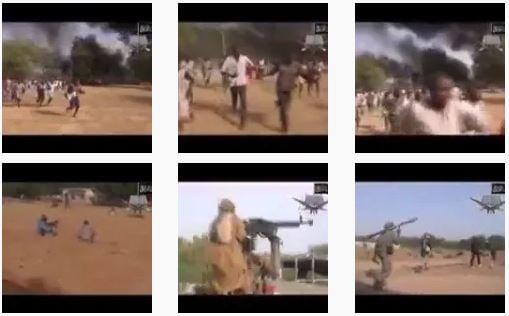
Screenshots of a Boko Haram attack on Giwa barracks, Maiduguri in March 2014
“I together with other families of the detainees rushed to Kayamala, a nearby village. We were herded in a house where we prayed. A few minutes after some of us left the house in search of our husbands, it was hit by a bomb. I could have died that day if I stayed a few minutes longer,” she said.
It was later she heard that soldiers were hunting down the escaped detainees and executing them in broad daylight.
According to a sector leader of the youth vigilante group known as Civilian JTF, Abdullahi Dere, not fewer than 207 escaped detainees were recaptured and executed in the reprisal attack by the army. But majority of the casualties were mere suspects, said witnesses.
“Those who did not follow Boko Haram into the bush were the ones killed by the soldiers, and many of them were not Boko Haram,” said the locals who witnessed the killings.
Several media reports also confirmed that innocent citizens caught in the coordinated military attack lost their lives that day. Amnesty report put the total death at 64o – men and boys.
“Since that day, I never got any information about my husband again. I don’t know whether he died that day or he is still alive,” Aisha said.
She recalled seeing other women who also came hoping to see their son, but only saw a heap of dead bodies instead, and no one was allowed to identify or take away the bodies before they were loaded into the military ambulance and taken away to be buried in a mass grave.
“Many of us went home that day devastated for we did not know whether our husbands and sons were alive or were killed by the soldiers,” she added.
Fatima Hassan Goni, 55, was probably the most distraught of the women that gathered at Hajja Gana house that Wednesday noon. When other women had stopped crying, she could not be consoled. Therefore, other women simply watched in silence until her paroxysm of weeping subsided.
Her two sons, Ibrahim and Musa were arrested in their home in Gonge 3 on a Sunday morning in September 2013. The incident started when a bomb blast occurred in the neighbourhood. Mrs. Goni was certain soldiers would soon invade the community and arrest any youth insight. She told her two sons to promptly leave the neighbourhood. But the two assured their mother they would be fine since they were not out on the street.
They were wrong.
When soldiers arrived later, the two brothers were forcefully taken out of their home. They were too dumb-struck to resist arrest. Fatima helplessly watched them being dragged into the waiting truck by gun-wielding soldiers. She had recently witnessed the killing of two teenagers by soldiers in the neighbourhood, and did not want to upset the young soldiers, and caused mortal harm to her sons. Minutes later, the vehicle drove away.
‘I ran blindly to Giwa barrack, and pleaded to the officers on duty that my son is a banker, the younger one is a student [Engineering student at Ramat Polytechnic]. Then they asked me to bring a letter of identification from Fidelity Bank by 12pm. Halima, the assistant bank manager, and other bank officers accompanied me to the barracks with the letter, but we were chased away – all of us.”
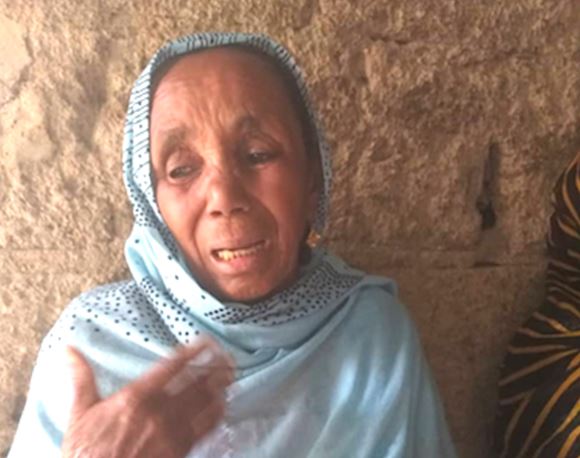
Fatima Hassan Goni crying for her children.
Her two sons were taken away in September 2013
Since then, Fatima has not received news of her sons.
His colleague at the bank, Kingsley Emuche, in a phone interview with The ICIR confirmed that Ibrahim was a staff of Fidelity Bank. “One afternoon we just heard that he is being arrested and detained. And that was the last we heard of him,” he said.
It was the uncertainty of the whereabouts of their sons and husbands and the indifference of the army authorities towards their concern that led women of Jire Dole to begin protests against the Nigerian government.
As a pressure group, the women believe they can get the military authorities to account for the detainees in their custody and those that have been killed.
“We need to know what happened, even if our sons are dead,” Hajja Gana said to journalists on March 14 during the fifth year anniversary of the attack of Giwa barracks where many detainees and innocent civilians were killed.
‘HEARTLESS SOLDIERS IN MAIDUGURI’
The ICIR interviewed many families in Maiduguri, and they all confirmed that several soldiers were involved in arbitrary arrest and extrajudicial killings of young men in Maiduguri between 2011 and 2105 , but the record of a particular army officer was legendary.
His name is Cyril Ofurumasi, a colonel though the locals know him as Yellow. He was the “most heartless and wicked soldiers”, said members of Jire Dole who came for a monthly meeting at the house of Hajia Hamsatu, a leader of the group.
Often, he would lead his team to communities and indiscriminately arrest young boys and detain them at Giwa barracks, members of Jire Dole told The ICIR.
“I know this Yellow. I don’t know his real name, but he was called Yellow by everyone,” said Hajja Gana.
When the reporter showed her a photograph downloaded from the Facebook page of Colonel Ofurumasi, she confirmed that he was indeed the man who terrorised many communities in Maiduguri.
“Yes, this is Yellow. We know him as a killer…He had killed so many young men in Maiduguri.”
The leader of Jire Dole said Yellow once came to Baga market, arrested all the youths in sight and none of those boys are seen again.
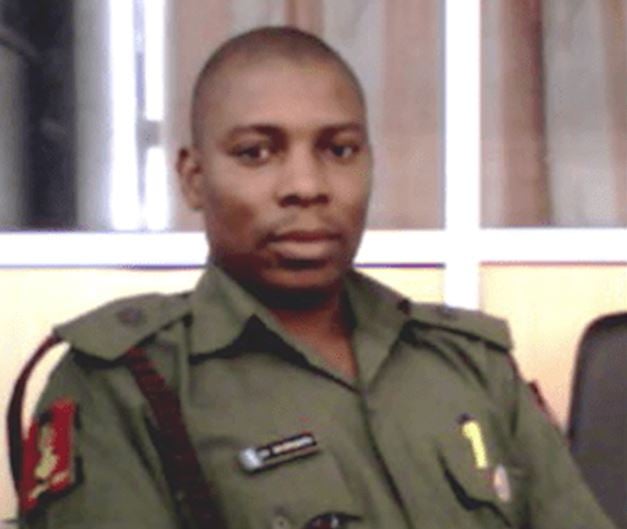
Ofurumasi
An intelligent officer in one of the security forces in Maiduguri confirmed the story of the women.
“The number of youths arrested by Yellow and his team alone could not be less than 300. And many of those young boys have disappeared till date. But the jailbreak removed the record so it is difficult to account for their death” the officer told The ICIR in confidence.
“All the ex-prisoners who reported or taken back to Giwa barrack by the Civilian JTF during the Giwa jailbreak were executed by Ofurumasi and his boys,” the intelligence officer said.
The officer further recalled how Ofurumasi in company of other soldiers stopped him while returning home from an assignment given to him by a top ranking military officer senior to the colonel.
“Despite identifying myself as a security officer, he ordered that I should lie down and threatened to execute me that night until his boss whom I was allowed to call ordered him to let me go. These soldiers placed no value on human lives,” said the intelligence officer.
A staff of National Human Right Commission in Maiduguri in an interview with The ICIR said Ofurumasi’s name usually comes up from the complaints submitted by petitioners at the NHRC office.
But Jumai Mshelia, the north-east zonal director, National Human Rights Commission, declined to comment or confirm whether she had received such complaints.
Other soldiers notorious for extrajudicial execution, according to the locals, were a soldier known as “Colonel Ebola” – nobody seems to know his real name – and Fambiya Amuda Fada, who was later killed in Gwoza.
A journalist who has been covering insurgency and the Operation Lafiya Dole in the north-east since the beginning in 2009 told The ICIR that it took the intervention of Col. Hassan to stop the indiscriminate arrest and detention of youths in Maiduguri.
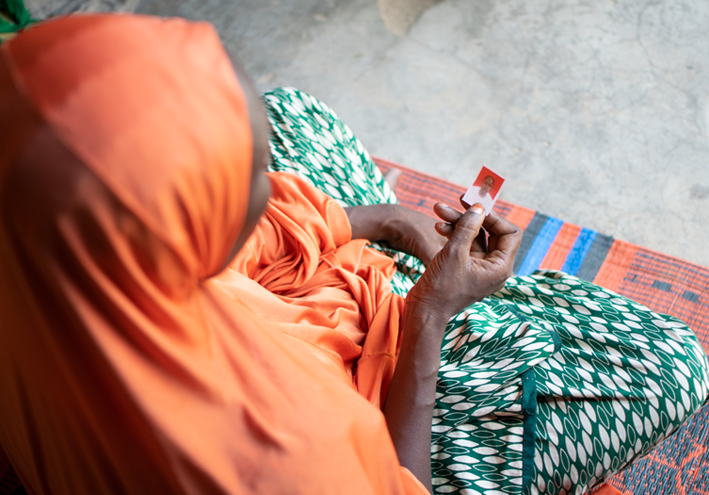
A member of Jire Dole with photograph of her detained husband
“Despite the atrocity perpetrated by soldiers in Maiduguri, many of them are still working free. None of them to my knowledge has been sanctioned by the military authorities,” said Hajia Hamusatu.
“The exception was an airforce officer who was reported for raping a minor while she went to fetch firewood. Yes, he was dismissed, but there was no remedy for the girl.”
HIDE AND SEEK WITH OFURUMASI
When The ICIR called Colonel Ofurumasi via telephone, he told the reporter that the number called was a wrong line.
The ICIR checked the number again through TruCaller and confirmed that it was registered in his name. Also, the displayed photo on Whatsapp status showed the images of his three children (A girl and two boys) which are also displayed on his Facebook page.
When the reporter called again and tried to inform him how Centre got his number, he dropped the call.
Messages sent to him via SMS and Whatsapp were also ignored.
AUDIO: Conversation between Col. Ofurumasi and I
“Conversation between Col. Ofurumasi and I”
Giwa barracks as torture chamber?
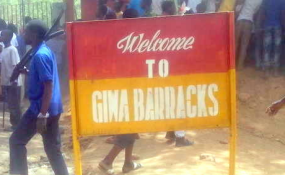
Giwa Barracks
There are three military barracks in Maiduguri. They are 33 Artillery barracks, 7th Division Maimalari barracks and 21 Armoured Brigade Giwa barracks. Giwa barracks has the largest military detention facility among them. Prisoners in the facility are mostly confirmed or suspected Boko Haram member or their family members. Amnesty International has reported in 2018 about the deplorable conditions of the detention. Not fewer than five women died in the cells in Giwa barracks between 2015 and 2017, and 32 children died in 2016 and 2017 combined. And most of the women who gave birth while in detention reported doing so in their overcrowded dirty cell with no assistance.
RUNNING BATTLE BETWEEN THE ARMY AND AMNESTY INTERNATIONAL
Amnesty International is a global NGO holding governments accountable for the abuse of human rights. The organisation’s record on Nigeria is dismal, and for the Nigerian Army in particular, the record is worse.
AI, for instance, has found that senior military officers, alleged to have committed crimes under international law, have been cleared. And Giwa barracks, the military detention facility where many suspected Boko Haram are held captive, is extremely overcrowded, with poor sanitation and insufficient ventilation, causing frequent death of detainees. And the detainees are denied access to see their visiting family members and lawyers.
“The Nigerian authorities held mass secret trials for Boko Haram suspects; 50 defendants were sentenced to various terms of imprisonment in a trial that took place over four days,” Amnesty International reports.
But the army are very discreet about these violations.
AI country director in Nigeria, Osai Ojigho told The ICIR in a phone interview how the army authorities frustrate her organisation effort to demand accountability about operation Lafiya Dole in the northeast Nigeria.
“It is very difficult to get the army to provide any information about the people held in their custody. We don’t have information about those released or going under rehabilitation. Often time when we send requests to the army, it went unacknowledged,” she said.
In December 2018, the army authorities and the AI clashed over a report “Star on Their Shoulders, Blood on Their Hands” which accuses the Nigerian military of committing war crimes while fighting insurgency in the north-east.
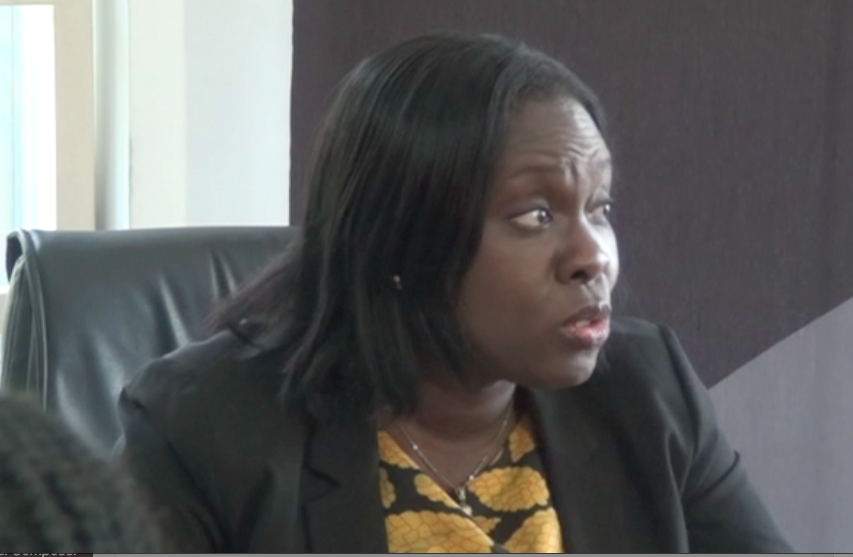
AI Country Director Osai Ojigho
The military has denied the accuracy of the report, and called for the closure of AI in Nigeria but the army is yet to come open about its operation in the region. Since then the relationship between the two organisations has been defined by tension and suspicion.
OFFICERS CONFIRM EXTRA-JUDICIAL KILLINGS
Meanwhile, senior army officers in off-record interviews told The ICIR that the military is aware that some soldiers have performed below international best practice required of a professional soldier.
But they quickly added that the erring soldiers have been duly punished.
“Some of these soldiers have been investigated, tried and sanctioned, and those found not guilty have been released,” said an army officer who works in the ministry of defence. But he did not provide the names of soldiers that were sanctioned.
Another officer, a colonel in the Nigerian Army, also hinted about on-going trial of soldiers involved in unprofessional act in the Northeast, but he also declined to identify the affected soldiers.
He however exonerated the army authorities from wrongdoings, saying the headquarters does not condone unprofessional practice from the men in the battlefront.
But Amnesty International report has refuted that claim. Ojigho said findings by her organisation has shown that soldiers were involved in “gross human rights violations”.
In response, the army officer said some of the erring soldiers had to resort to indiscriminate killings because of what they suffered while fighting Boko Haram.
“Do you know how many soldiers and their family members were killed during Giwa barracks in one day. In a war situation, the innocent also gets killed,” he said.
When asked why are people suspected of being Boko Haram still kept in custody without trial. He replied: “Some of the suspects have been tried and released. Some are undergoing rehabilitation. It is important we make them go through that process so that they can be properly deradicalised and fit for integration into society. But those of them who have not shown remorse may not be released until we are sure they are no longer a threat to society.”
International Humanitarian Law mandates the armed forces taking part in the conflict to protect every individual not or no longer actively involved in the hostilities. IHL is based on a number of treaties, in particular, the Geneva Conventions of 1949, Additional Protocols, and other instruments.
The law forbids violence to life and person, in particular, the murder of all kinds, mutilation, cruel treatment and torture.
This also includes carrying out of executions without previous judgement pronounced by a regularly constituted court, affording all the judicial guarantees which are recognized as indispensable by civilized peoples.
Acts such as these constitute a war crime, according to the Geneva Conventions and their Additional Protocols to which Nigeria is a signatory.
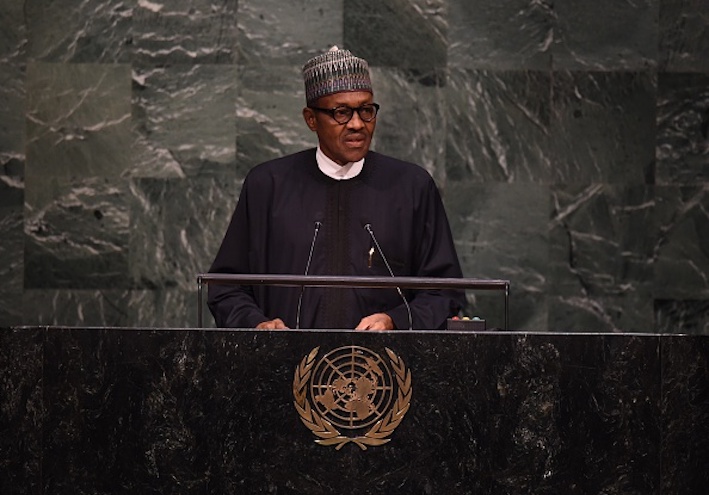
President Muhammadu Buhari speaking at the United Nations Sustainable Development Summit to the at the United Nations General Assembly in New York on September 25, 2015.
NIGERIA ‘HAS THE HIGHEST NUMBER’ OF MISSING PERSONS IN THE WORLD
Since the start of the Boko Haram insurgency in 2009, nearly 22,000 Nigerians have been reported as missing, and the majority of these are minors, according to the International Committee of the Red Cross (ICRC).
This is the highest number of missing persons registered with the ICRC in any country.
During his five-day visit to Nigeria in September, ICRC President Peter Maure said, “Every parent’s worst nightmare is not knowing where their child is. This is the tragic reality for thousands of Nigerian parents, leaving them with the anguish of a constant search. People have the right to know the fate of their loved ones, and more needs to be done to prevent families from being separated in the first place.”
Maure insisted that all civilians must be spared in war. But in northeast Nigeria, civilians are the worst casualties of the war against Boko Haram insurgency.
“Every family in this city suffers, and lost something very important during the fight against Boko Haram,” said Mshelia, the North East zonal director, National Human Rights Commission.
For Borno children like the seven-year-old Walid, it would take a long time for them to count the cost of their loss.



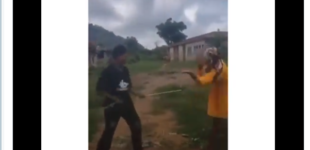

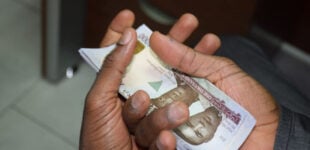

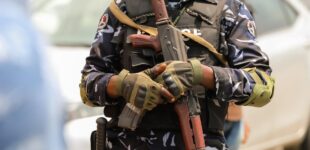


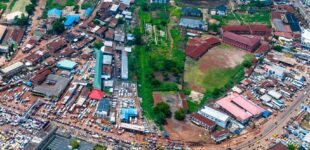
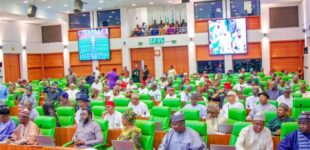

There are no comments at the moment, do you want to add one?
Write a comment